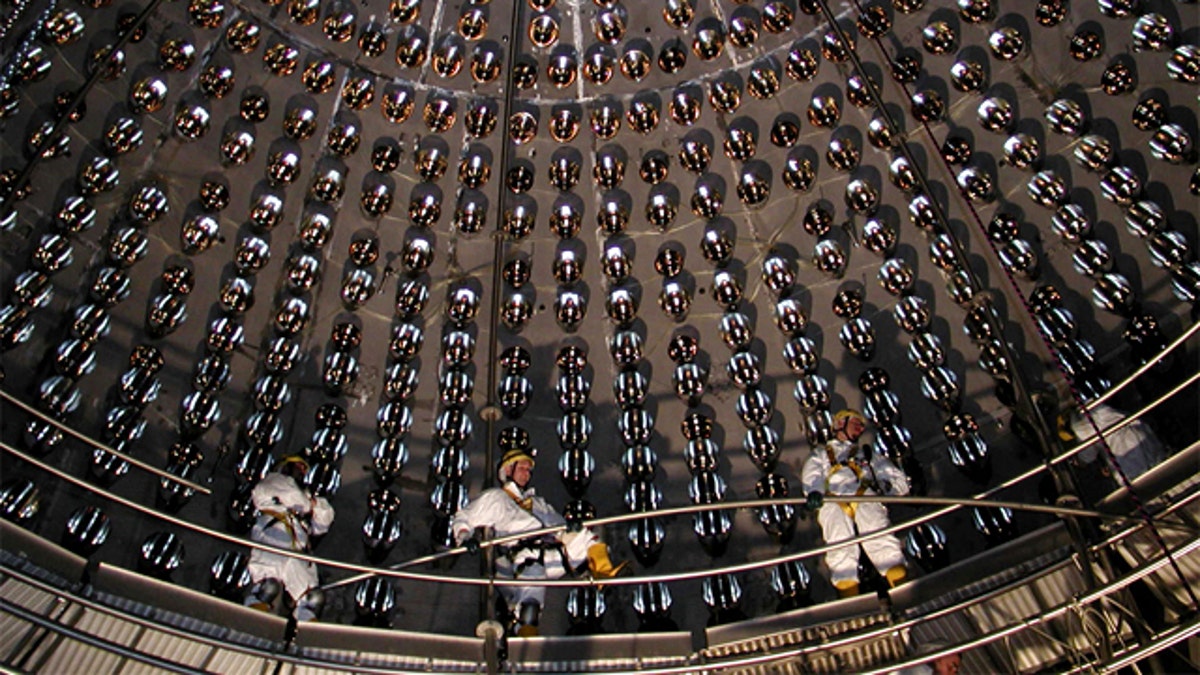
The Gran Sasso National Laboratory of the Italian Institute of Nuclear Physics, located nearly a mile below the surface of the Gran Sasso mountain about 60 miles outside of Rome, detects tiny particles called neutrinos. (Paolo Lombardi INFN-MI)
Nothing goes faster than the speed of light. At least, we didn't think so.
New results from the CERN laboratory in Switzerland seem to break this cardinal rule of physics, calling into question one of the most trusted laws discovered by Albert Einstein.
Physicists have found that tiny particles called neutrinos are making a 454-mile (730-kilometer) underground trip faster than they should — more quickly, in fact, than light could do. If the results are confirmed, they could throw much of modern physics into upheaval.
The results come from the OPERA experiment, which sends sprays of neutrinos from CERN in Geneva to the INFN Gran Sasso Laboratory in Italy. After analyzing the results from 15,000 particles, it seems the neutrinos are crossing the distance at a velocity 20 parts per million faster than the speed of light.
By making use of advanced GPS systems and atomic clocks, the researchers were able to determine this speed to an accuracy of less than 10 nanoseconds (.00000001 seconds). [Countdown: The Coolest Little Particles in Nature]
Realizing full well how scandalous the results will be if they are borne out, the scientists behind OPERA, led by Antonio Ereditato of the University of Bern, have decided to make their data public, in hopes of inviting scrutiny that could make sense of such radical findings. The scientists also intend to gather more data and further analyze their measurements in order to establish them more fully, or refute them. Their results will be published Friday (Sept. 23) on the physics preprint site ArXiv.
Previous studies have found that certain materials can travel faster than light through a medium. For example, certain particles are able to move more swiftly than light when travelling through water or oil. However, nothing should be able to move faster than light through a vacuum.
"It's thought to be an absolute speed limit," said Michael Peskin, a theoretical physicist at SLAC National Accelerator Laboratory in Menlo Park, Calif. "Quantum filed theory, the mathematical theory on which basically all results in particle physics are based, has the property that signals cannot travel faster than the speed of light through a vacuum. It's really an absolute prohibition."
Peskin is not part of the OPERA team, and hasn't yet seen data from the new findings.
This cosmic speed limit, 299,792,458 meters per second (about 700 million miles an hour), forms the backbone of Einstein's seminal Theory of Special Relativity, published in 1905. To rewrite this law would have broad-ranging implications, including even the possibility of time travel.
CERN plans to discuss the findings Friday during a public seminar that will be broadcast at http://webcast.cern.ch.
* Twisted Physics: 7 Mind-Blowing Findings
* Image Gallery: Northern Lights Dazzle
* Top Ten Unexplained Phenomena
Copyright © 2011 LiveScience.com. All Rights Reserved. This material may not be published, broadcast, rewritten or redistributed.
